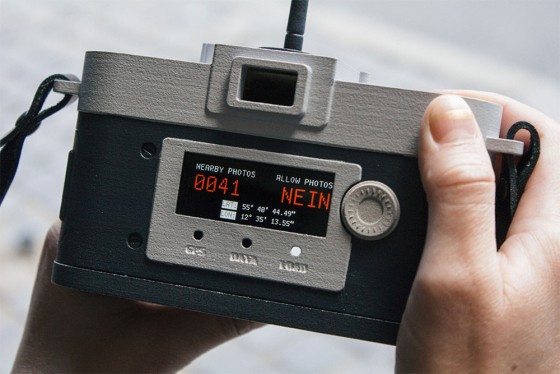If your business needs more original photography that doesn't look generic, there might be a new camera available soon that will help you avoid taking a picture that looks like everything else online.
Or if you're a consumer and you always feel self-conscious about posting your 17th picture of a sunset over your city — yet you cannot stop the compulsion to photograph and post pictures of sunsets, even when there's no interesting variation in the shot — you might need this camera (and your Instagram followers might be willing to crowdfund it for you).
It's called the Camera Restricta, and even though it's still in its prototype phase it's causing quite a stir in both the tech and photography worlds.
And like any new tech worth discussing, it is both delighting and offending people, depending on who's talking.
How It Works
Wired Magazine featured the camera in a recent Sept. 2015 story. The article introduced the world to a German designer named Philipp Schmitt and his new invention, the Camera Restricta.
The Camera Restricta is built to house a smartphone, and then it taps into GPS metadata from sites like Flickr and Panoramio to assess how many pictures have been taken at your precise location. It judges this by counting how many pictures have been taken within 115 feet of where you're standing. If it counts more than 35 photos taken at that spot in any direction, the camera's shutter closes.
Yes, you read that right; the camera will not let you take a picture.
As Wired humorously put it: “Want to snap a pic of the Eiffel Tower? Good luck, because it’s not gonna happen. But that gas station next to the Dairy Queen in Grand Island, Nebraska, is fair game.”
As snarky as that might sound, Wired actually liked the camera and the idea in general. Its external casing has a large, bulky (but appealing) look of a retro camera with a screen in the back. The digital interface seems nicely developed as well. The camera's display shows the number of photos taken in a location, and when it blocks you from taking a picture it emits a sound to alert you — a sort of warning bell that implies: “Okay, I don't think so, this picture is not happening; time to keep moving and find another spot.”
That being said, there are people who definitely do not like the camera or the concept in general.
What People Don't Like: The Prospect of Censorship And A Camera That Misreads The Situation
Schmitt himself acknowledged that he has encountered plenty of resistance to the camera, though he does admit there are flaws with the current design. Using one GPS point as the sole reference for whether the camera takes a picture or not creates headaches. For example, by simply standing within 115 feet of a popular landmark like the Roman Colosseum that's been photographed thousands of times, you won't be able to take any pictures of anything in that location even if you're not there to photograph the Colosseum. Maybe there's some cool looking bench or some other person or object that you want to photograph, but if it is near a popular landmark you're out of luck.
There's also the concern of censorship. If Schmitt develops the technology further, people fear that governments will re-purpose the invention to enforce censorship.
Despite any design flaws or concerns, plenty of people find the idea fascinating and even funny.
What People Like: A Camera That Saves You From Poor Decisions
Although the Camera Restricta could benefit from a more nuanced ability to judge the quality and originality of a picture, it could add an interesting twist to the visual world we create online. As people continue to dump all of their personal photos online and build a vast, user-generated photo-library and photo-history of the world, technology like this functions as quality control.
It's also hilarious. And, frankly, it's hilarious because it's true. There are millions of photos online that should have never been taken. As Wired Magazine remarked:
..mostly, I find the concept funny. I’d like to see it taken even further, so that a camera’s viewfinder uses image recognition software to determine if what you’re looking at, not just where you are, is a worthwhile photo. It could take into account different parameters—time of day, season, how many people have taken similar photos on Instagram—and then tell you that maybe that photo of your feet in the sand on a beach isn’t such a good idea after all.
Imagine a paintbrush refusing to paint because it sees how terrible the picture is or an electric guitar that switches the amp off automatically when the musician plays “Stairway To Heaven” one too many times. It's funny but fascinating: digital technology could take on a more powerful role than we ever imagined in our creative lives.













